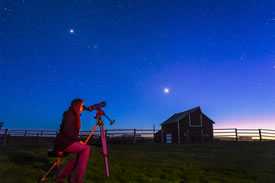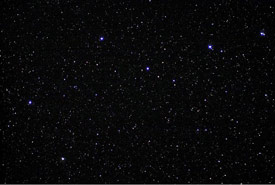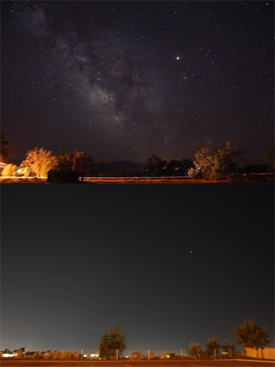Look up more

Old Man on His Back, SK, has just been named Canada's second Dark Sky Preserve (Photo by Alan Dyer)
I love the dark. I am that person that perpetually goes around the room and turns off all the lights, so that you, slightly annoyed at the lack of visibility, have to go around and turn them all on again.
I’m that person that wears sunglasses at night, takes forever to get around to changing a lightbulb and when she does she picks one of those warm yellow ones because those cool blue ones are just too damn bright.

The bowl and a portion of the handle stars of the Big Dipper as seen from the International Space Station (Photo by Donald R. Pettit, NASA)
I grew up in the countryside northwest of Calgary, and when I was a kid I would lie out on the lawn on summer nights and stare at the stars. If we were out camping, I would walk back to our tent with my head tilted back at a 90-degree angle so I could take in the Big Dipper and the Milky Way (it’s a wonder I didn’t run into anything).
I know what you’re thinking though, and you’re wrong. I wasn’t one of those child science prodigies with a telescope in hand and a brain full of memorized constellations. The Big Dipper and Milky Way were literally the only celestial objects I knew – unless you count the moon. Whenever I admired the night sky I did so without an agenda, or even much thought. I didn’t study it. I didn’t label it. I just looked at it, and thought, “Woah.”

The Milky Way (Photo by Bruno Gilli, European Southern Observatory, Wikimedia Commons)
In hindsight, that perhaps was not the most articulate response I could have had, but the night sky is one of those things that literally puts the “awe” back in “awesome.” How do you describe something so vast and all-encompassing? The sky seems like a constant in our ever-changing landscape. It is always there and always will be.
Fast-forward to today and I am quickly realizing that despite my love of the dark, I have taken the night sky for granted all my life. When I moved to the city to study environmental science at the University of Calgary, I never once stopped to think about the importance of the night sky. When it came to my studies, my eyes were fixed firmly on the ground.
However, in moving to the city I slowly began to realize that the night sky actually wasn’t there all the time – at least not in its full brilliance. It was dulled by the effects of light pollution, but I didn’t let that bother me. I could still find the stars on that short drive back into the country.
I didn’t really clue in to the importance of dark sky conservation until last year. In 2015, the Nature Conservancy of Canada’s Old Man on His Back Prairie and Heritage Conservation Area (OMB) was declared a nocturnal preserve by the Royal Astronomical Society of Canada. I confess I didn’t know exactly what that meant at the time, but OMB holds a special place in my heart so I knew I wanted to head down there for the official announcement.
Somehow I convinced my friend that the five-hour trip from Calgary to remote southwest Saskatchewan was a good idea. We loaded up my car and headed off into the grasslands. Little did I know, this summer road trip to Saskatchewan would mark a turning point in the way I thought about the night sky.

OMB night sky panorama (Photo by Alan Dyer)
On that trip I learned that darkness plays an important role in the daily rhythms of people, wildlife and plants. I learned that artificial lighting at night can disrupt our immune systems and sleep patterns. It can confuse birds, sea turtles, frogs and insects that are active at night, and disrupt plant growth. Our planet grew up on a requisite dose of daily darkness, and now we’re messing with the prescription.
Perhaps most poignantly of all, I learned during that trip that due to sky glow – the reflection of artificial light off the atmosphere – an estimated two-thirds of the world's population can no longer see the Milky Way at night. Since the Milky Way played such a defining role in my childhood star-gazing experiences, that particular statement was hard to take in.

Comparison showing the effects of light pollution on viewing the sky at night. (Photo by Jeremy Stanley, Wikimedia Commons)
It is one thing to forget something that is no longer with us, like the infamous dodo that succumbed to extinction in 1662, but I think it is incredibly sad to think that two thirds of the world population will slowly start to forget about the Milky Way, when it still exists beyond the haze of our city lights.
Luckily, unlike many conservation issues that impact the planet today, the great thing about light pollution is that it is reversible. Organizations like the Royal Astronomical Society of Canada and the International Dark Sky Association are working to protect and recognize designated dark sky sites and provide a list of tangible actions individuals and cities can take to reduce the impact of light. People can even become citizen scientists and get involved in dark sky research by measuring light pollution by using apps like Dark Sky Meter and Loss of Night.
So on International Dark Sky Week, let’s all make the conscious decision to look up more, remember what’s there and what we stand to lose when we light up the night sky.


